On November 30th, the 40th Anniversary Celebration of the Reconstruction of Archival Science and the Symposium on Archival Science Talent Cultivation in the Intelligent Era was held at Wuhan University.

VIPs attended the event were as followings:
Huiling Feng, former Executive Vice President and National Distinguished Professor at Renmin University of China,
Hua Fu, former Deputy Director of the National Archives Administration,
Xiaochun Liu, Deputy Director of the Hubei Provincial Archives,
Longqiang Chu, Deputy Secretary of the CPC Committee of Wuhan University,
Bin Zhang, Chair of the Teaching Steering Committee for Archival Science at Universities under the Ministry of Education and Professor at Renmin University of China.
Over 200 experts, scholars, and student representatives from the archival field participated.

Longqiang Chu welcomed the leaders and experts and expressed sincere gratitude to the institutions that have supported the development of Wuhan University’s archival science. He emphasized that Wuhan University is committed to building an archival discipline with distinctive intelligent characteristics and aims to cultivate a batch of high-level archival talents who possess international perspectives, proficiency in intelligent technologies, and innovative spirits. Looking ahead, Wuhan University will focus on national strategic needs and socio-economic development requirements, undertake the mission of education for a strong nation, and further develop the archival discipline to become a solid support force for the university’s high-quality development.
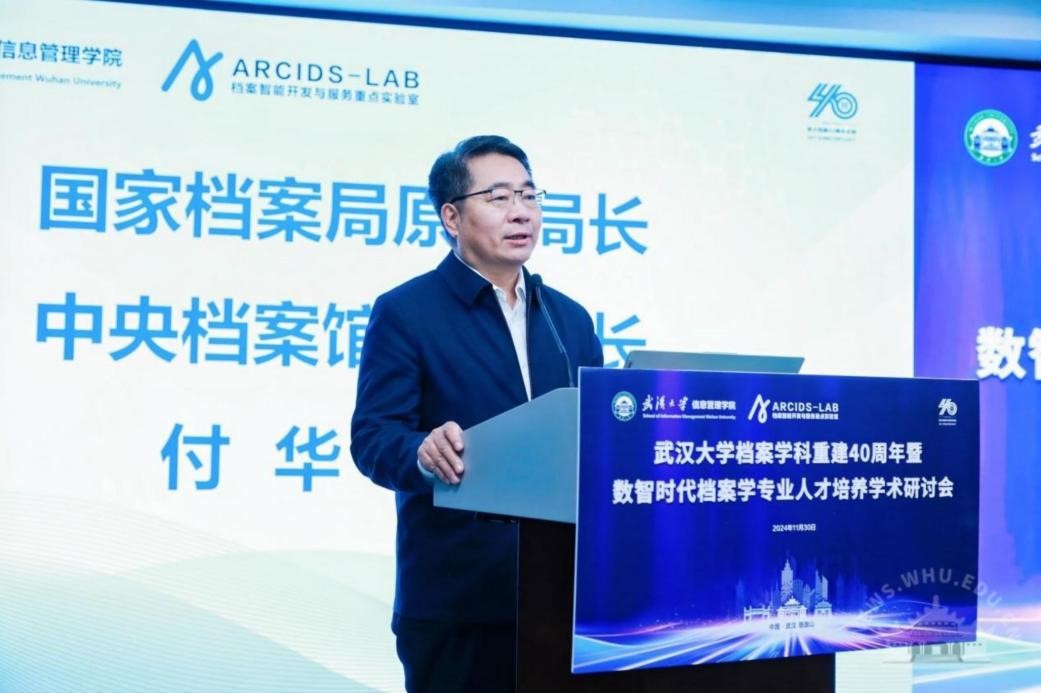
Hua Fu reviewed the development of China’s archival cause. He pointed out that over the past 40 years since its reconstruction, Wuhan University’s archival discipline has adapted to the talent needs of China’s reform and opening up, leveraging its own characteristics and advantages to make significant contributions to the country’s archival development. He proposed focusing on practice-driven scientific research, strengthening theoretical innovation in the new era of archives, and cultivating archival talents needed by the nation to continuously open up new horizons for the archival cause.
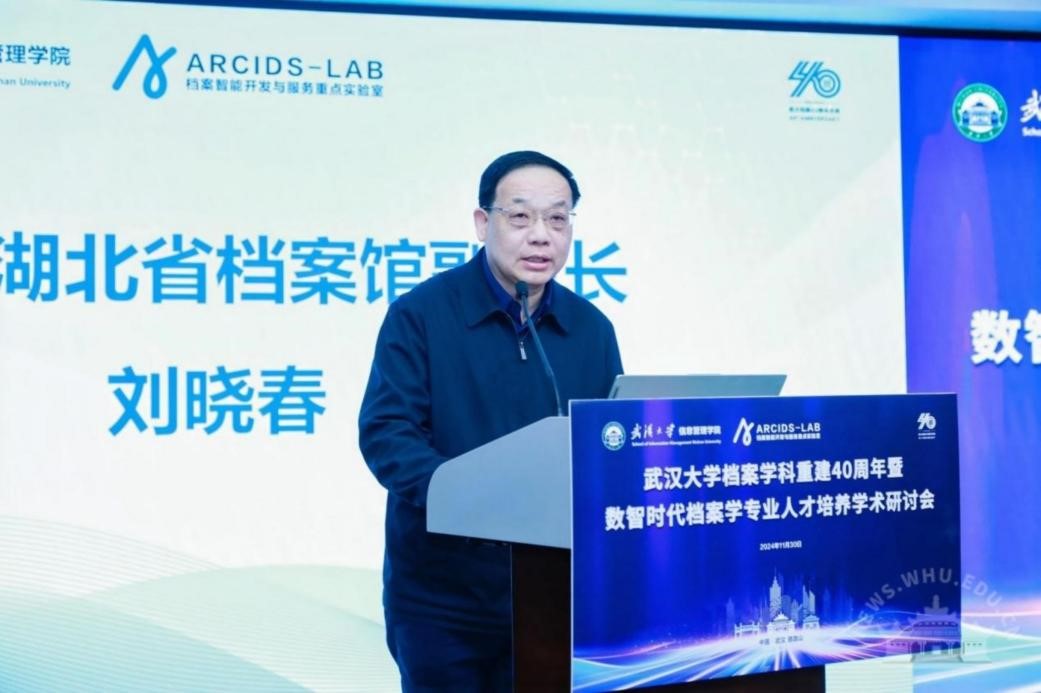
Xiaochun Liu thanked Wuhan University’s archival discipline for providing continuous intellectual support and innovative momentum to the archival development in Hubei Province. He stated that the Hubei Provincial Archives will support Wuhan University’s archival discipline in areas such as school-archive cooperation, advanced technology R&D, and talent cultivation. Leveraging the jointly established National Archives Administration Key Laboratory for Intelligent Development and Service of Archives, both parties will explore new paths for collaborative school-archive efforts and integrated industry-academia-research advancement.

Bin Zhang reviewed the basic situation of archival higher education since China’s reform and opening up and congratulated Wuhan University on the 40th anniversary of the reconstruction of its archival discipline. He noted that Wuhan University’s archival discipline has made remarkable achievements in archival teaching, theoretical innovation, and industry practice, writing a significant chapter in China’s archival education history. He wished that Wuhan University’s archival discipline would continue to strive and achieve greater success in the new era, contributing to the construction of an independent Chinese archival knowledge system.
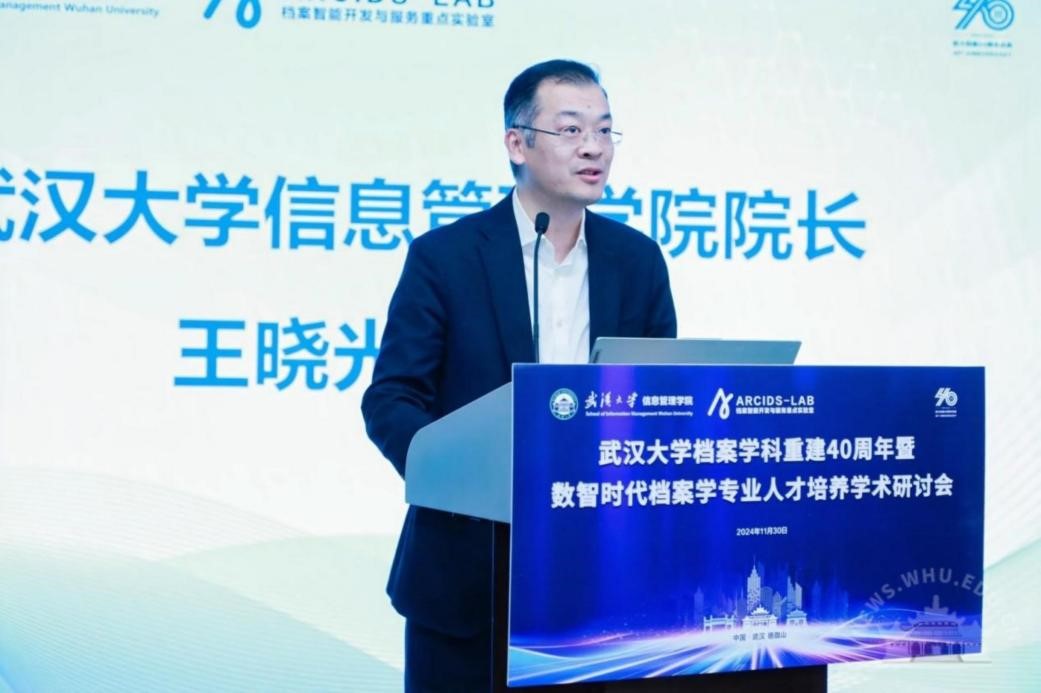
Xiaoguang Wang, Dean of the School of Information Management, thanked the academic and professional communities for their long-term concern and support for Wuhan University’s archival discipline. He indicated that the School of Information Management actively promotes the digital transformation of archival science, forming a multi-disciplinary teaching team, insisting on government-industry-university-research dialogue, strengthening international cooperation, and exploring innovative development paths for archival science. The school will continue to advance forward-looking layouts and connotative development of archival science, cultivating more archival talents with intelligent driving ability, industry leadership, and international competence.
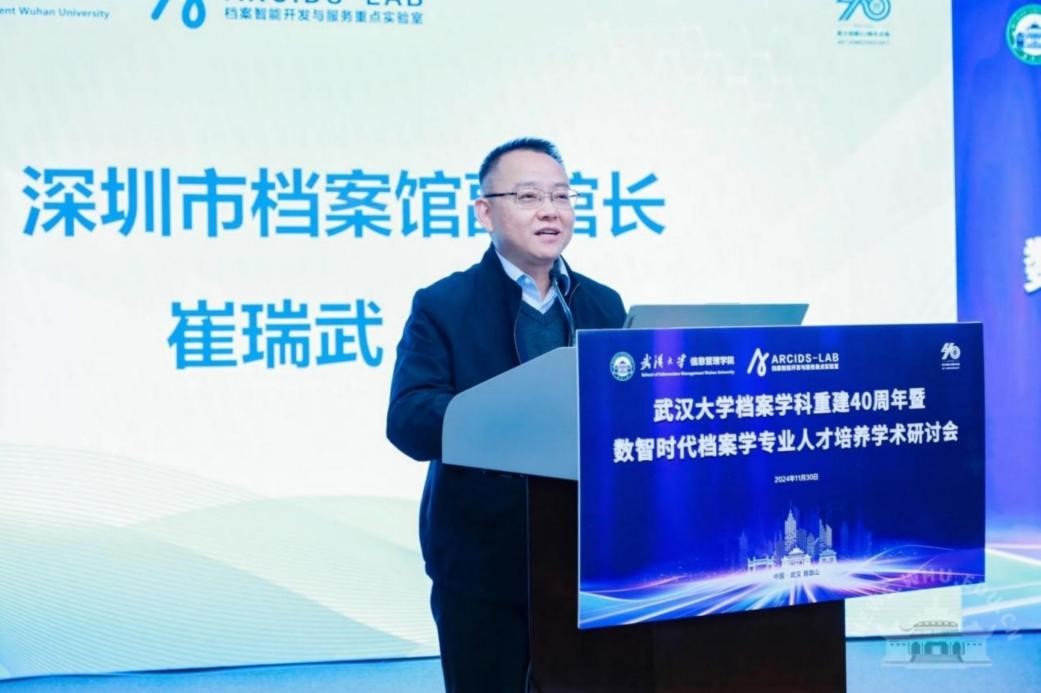
Ruiwu Cui, Deputy Director of the Shenzhen Municipal Archives, recalled his four years of studying archival science at his alma mater, sharing memorable learning experiences and anecdotes. He thanked his alma mater for its dedicated nurturing, noting that the forward-looking curriculum design and practice-oriented teaching model had cultivated a deep information management literacy, significantly impacting his career development. He wished his alma mater greater achievements in archival science construction and success for the students.

Bowen Zhang, a 2023-grade doctoral student at the School of Information Management, shared his gains and insights from studying archival science. He expressed satisfaction with the abundant learning resources provided by the archival discipline, happiness with the teachers' diligent spirit and caring attitude, and pride in the discipline's educational philosophy and achievements. As a student who majored in archival science from undergraduate studies, he pledged to contribute to the development of archival science.
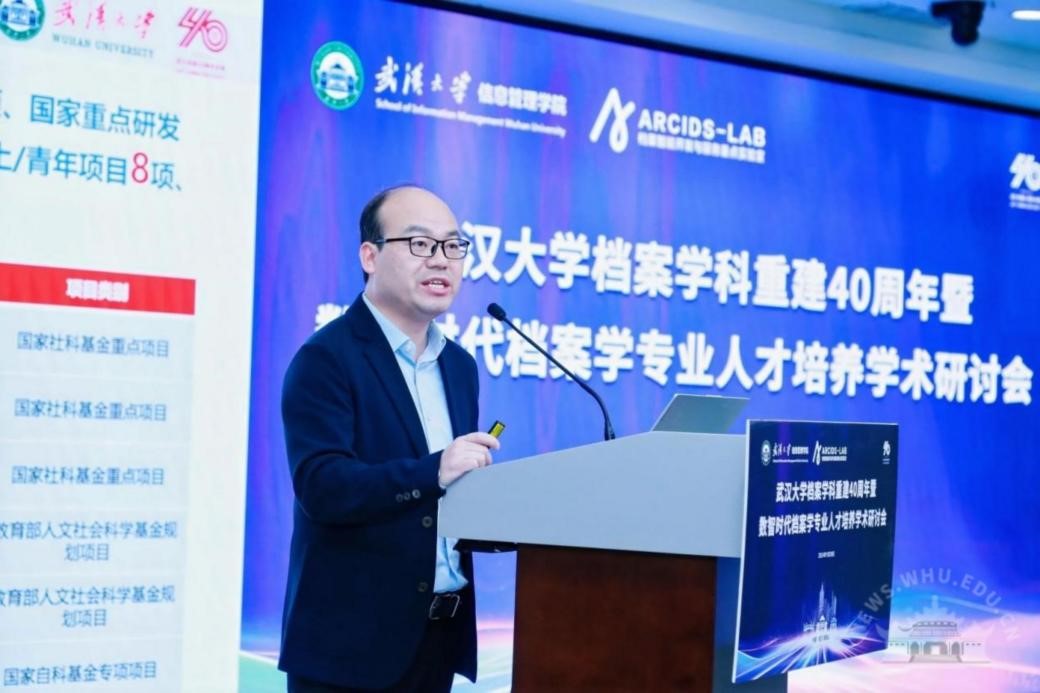
Ping Wang, Director of the Department of Archives and Government Information Studies, reported on the development of Wuhan University’s archival discipline. He stated that at this new historical starting point, the archival discipline will accelerate the application for international CILIP professional certification, cultivate globally-minded intelligent talents capable of participating in global governance; increase the introduction of talents to optimize the faculty structure; consolidate research forces to form research specialties, creating research highs in archival cultural heritage and government big data; promote the implementation of archival research results to serve the development of archival science and industry.

Huiling Feng delivered a keynote speech titled Look Forward and Take Action. She discussed the current challenges and development strategies faced by archival science. Drawing on her experience of shifting academic research focuses twice, she proposed that archival science teachers in the intelligent era should not only keenly capture future trends but also cultivate students' imagination, creativity, understanding, and empathy in a human-machine coexistence environment. She also emphasized closely integrating archival academic research with practice, discovering problems, and exploring truths in practice. She called for archivists to think and act together to write a new chapter in the development of archival science in the intelligent era.

During the symposium on archival science talent cultivation, participating experts and scholars engaged in lively discussions on innovative concepts, frontier issues, and hot topics related to archival science talent cultivation and academic research. They clarified the ideas, priorities, and directions of archival science talent cultivation in the intelligent era and expressed their willingness to deepen industry-education integration and research-education convergence to improve the quality of archival science talent cultivation.
During the conference, the 10th National Forum for Young Archival Scholars at Colleges and Universities was also held. This forum included one interdisciplinary forum and four parallel sub-forums, where more than 50 archival scholars from Wuhan University and other universities engaged in in-depth exchanges and discussions around the theme of Digital Transformation of Archival Causes. These discussions provided insights and suggestions for the digital transformation and sustainable development of archival causes.
Wuhan University began re-admitting undergraduate students in archival science in 1984. Over 40 years of development, the archival discipline has formed unique research characteristics in areas such as archival information resource management, electronic document management, government information resource management, intelligent development and service of archives, and protection of archival documentary heritage. It has cultivated a batch of professional talents dedicated to managing archives for the Party, preserving history for the country, and serving the people, contributing wisdom and strength to the construction of a strong archival nation.